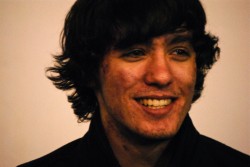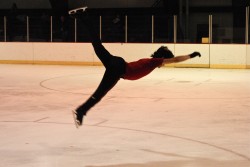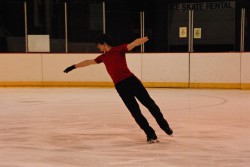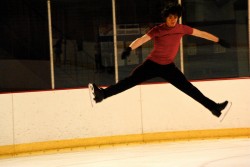
Senior David Skuza steps onto the ice rink. Classical music plays softly from the speakers, with a violin performing its solo, providing a jolly “inspirational” mood for the figure skaters. He’s dressed in his favorite colors: a red shirt and black athletic pants along with his smooth black skates, and black cotton gloves. He’s accompanied by 10 other girls (ranging from the age 7-15) who are there to practice their routines as well. Each one dances on the ice, re-running their spins, turns, and jumps. David sways through the collection of girls, weaving in and out, going to the outer edge of the large oval. He works his speed up, gliding his feet one in front of the other, focused on what’s about to happen.
As he moves smoothly around the sides, he meets the opposite side of the rink, anticipating his moves carefully, finding the space he wants to perform his jump. He increases his speed, then pushes himself up, swiftly tucking his arms into his chest, and turns his body to one side. He flies in the air, as he’s starting his spins. One, two, three. Gravity pulls him back to earth, and he comes out of his jump, placing a skate on the ice. All the excitement catches up to his legs, and they slip from under him. He falls, still graceful, but defeated. David lies on the cold surface, and takes a long sigh. His head shrugs as he pushes himself back up with his arms, balancing casually on his skates. His coach shouts “Skuza!” from the sidelines of the rink, and David retreats back, moving more sluggishly now since he’s disappointed. After receiving a quick pep talk, and spirited arm-placement tips, he heads back to the top of the oval rink, ready to try it again.
As a young kid, David was introduced to the skating world early on. Sitting at home one day, around the age of 5, his eyes were glued to the TV as he saw professional ice skaters, floating artistically around the ice rink. His imagination went wild, picturing himself as a professional figure skater. And then he just decided that he wanted to take up figure skating, as opposed to a typical “boy sport” like football. He seemed nonchalant about the whole thing, not worried on what others might think. If he wants to do something, he does it. His skating career was always upbeat, practicing in competitions and such. At the age of 11, David conquered his biggest feat. He made it all the way to Junior Nationals. Since it was his first real competition, David got super nervous, and didn’t do as well as he hoped. Since then, it’s been rough to compete, but he stills work at it. “Confidence definitely makes the performance,” he states.
Growing up as a boy in a “girl’s sport” had its consequences. One day, while David practiced at the ice rink during his lesson, he was harassed by the typical hockey boys, whose practice was starting soon. As they yelled to him how “gay” he was and such, David kept calm, and ignored them, like a gentlemen. But now, though much more casual about the whole teasing business, he still remembers the negatives of being a guy in such a stereotyped “frilly” sport. “Skating is stressful, but I love it anyways,” he shares.

Not only is figure skating challenging mentally, but also physically. David reminisced of a certain story where he had come close with an almost-serious injury. While practicing his routine jumps, during mid flight, he flopped onto the ice, where is chin connected with the hard ground. Collecting what had just occurred, he looked at where his chin had met the brick-like surface. And there was nothing. Same old ice, with no traces of gushing blood. Amazingly enough, he was lucky that day, not having cracked his chin open. Some minor cuts and bruises was all he left at the end of practice. He was 7.
Skuza starts his day early, just in time to make 6 a.m. practices down in Park Ridge at the Oakton Ice Arena. Usually David skates alone on the rink, except for his coaches. He has four all together, who switch off teaching him different skating tactics. Skuza’s able to get some help from a professional though, since one of his coaches made it to two Olympics. In the afternoons, David shares the rink with adolescent girls who are practicing just like him. They range in ages, being as young as maybe 6 years old. Typical “soccer” moms watch from the stands, plotting the next step for their daughters skating career, whether it’s competing, or ending it entirely. From 6 to 7 in the morning, David skates, treating it like any other practice, although others might complain carelessly. Then after school, David is off to another hour-long practice. Saturdays are special though, because then he has two -hour practices, which start at 6:45 a.m. “It’s better then before,” says Skuza. “They used to start at 5:45.”
At practices, David goes through his daily routine, first starting out by stroking around the rink, getting a feel for how the ice is, and how practice will go that day. Next, he moves towards his jumps, starting from the basics, like the Waltz Jump, and then tries the harder ones, like a Lutz. Although he cannot land all the harder jumps as perfect as he likes yet, he keeps working at it, because he has the dedication to do so. His role model, he says, is probably Scott Hamilton since David has always wanted to do a back flip on ice.

For competitions, David usually decides his own outfits. Being a single figure skater, compared to as a couple, David’s personality can easily be brought out from his music and outfit choices. As for the assumption that all boys wear tights while skating, David begs to differ. “Not all guys wear tights!” states David. “I skate in pants.” Some music David has performed to range in style, being as upbeat as the classic “Pirate’s of the Caribbean” song, or more mellow, like a song from the Blue Man Group. Some advice from Skuza is make sure to not skate to songs with words in them. The judges will give you deductions for that. He chooses his outfits wisely, sticking to his plain style, not as much interested in the glamour of it all. He’s just there to skate, not win a beauty contest. “People pay a ton of money for that stuff,” says Skuza, surprised, but used to the cost. ”Let’s just say a new pair of ice skates costs about $1,000.”
Not only does Skuza dedicate his time in skating, but he also invests in being a drummer for the band Blame the Dog. They usually play Rock Metal or Rock & Roll. Joined by his buds, like Justin Kang and Erik Michalesko, they do pretty well at maintaining shows and such. They recently performed at Pizza Wars, and earlier played at the “Best of West” Benefit Concert. Skuza got into drumming just a few years ago. “I’m their third drummer,” he says casually.
He started drumming about two years ago, and just taught himself along the way.
As for his future, David has it all plotted out. He is planning on going to the Illinois Institute of Technology for Computer Science. There, he will learn the techniques he needs to become and iPhone/software programmer. “I want to work for Apple when I’m older,” he shares, which makes sense because his favorite class is Video Game Program Design and he already likes to make iPhone applications in his spare time. His favorite games on the iPhone now are Fruit Ninja and Stick Wars. As for his skating life, he still plans to figure skate in college, and the goal is to make it to the Olympics. But for now, he enjoys it for what it is. “Screw those who don’t like it!” he states. “I like it, and that’s all that matters.”

David stands again at the top of the ice rink. He takes a deep breath again; clearing his head. He increases his speed, searching for an open area away from the other girls. As he finds his space, his legs move faster. His body springs up into the air, but this time, his arms are placed more closely to his chest, tucked in and sturdy. His entire body moves in the same direction, circling three times above the ice. A leg sticks out, and is placed softly on the ice. Then the second one follows. His knees wobble a bit as he balances himself, but he doesn’t fall. “That was a good set up,” his coach yells across the way. “That was nice!” David heads back to his coach, this time smiling obviously. He doesn’t hide how happy he is with himself. He landed his triple jump. Finally.


r newton • Mar 9, 2011 at 7:57 PM
Great article, Maggie! I LOVED the last paragraph–I really felt the movement and the suspense. Nice work!!
Rosie